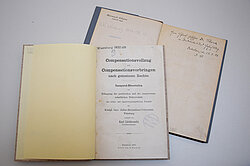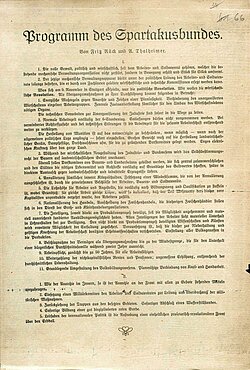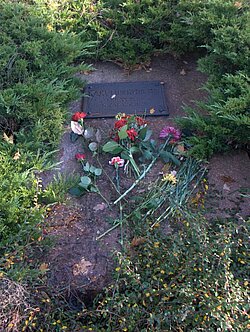Karl Liebknecht
* 13. August 1871 in Leipzig † 15. January 1919 in Berlin
Karl Liebknecht is connected to many things. The fight for communist ideals in Germany, the KPD (Communist Party in Germany), the fate of a violent death, which he shares with Rosa Luxemburg, etc. A connection that is less well known is one to Würzburg, or more precisely to the Julius-Maximilians-University. Even though he was never enrolled there, he received his conferral of a doctorate at the local University.
The University of Würzburg was home to a multitude of highly decorated scientists now and in the past, of which the Universitätsarchiv has presented several personalities in its regularly occurring series “Scholar of the Month”. In a new project, we want to portray the Alumni, who, in contrast to the lecturers and scientists, gained popularity outside the classic academic career path. Well-known personalities like Karl Liebknecht, Guido Knopp or Alois Alzheimer spent parts of their studies and / or obtained their degree in Würzburg, and will from now on also be given attention. We hope for a brisk interest of the students on their fellow alumni.
Political disadvantage
Before coming to Würzburg, Liebknecht studied Law and National Economics in Leipzig and Berlin and took his state exam in March 1893. It proved to be difficult for the prospective lawyer to find an engagement as a clerk, as the political position of his father, Wilhelm Liebknecht - who was one of the founding fathers of the social democratic party in Germany - presumably shut many doors to him. Only after a long search full of uncertainty and personal unrest he finally was admitted as a clerk at the regional appeal court in Hamm (Westphalia) in October 1893. However, he could only embark his position after completing his military service as a “one-year-volunteer”.
The path crossing Würzburg
The last step in his academic career on the way to become a lawyer was the promotion. In 1897 Liebknecht successfully obtained it at the faculty of law and state science of the University of Würzburg under Prof. Christian Meurer, who at this time was the director of the faculty and the professor for canon law, international law, encyclopaedia of law and philosophy of law. Liebknecht had to pay 300 German Mark fee for his promotion, which he successfully passed with his thesis about the enforcement of compensation and the state of compensation according to ordinary law. In a written personal dedication Liebknecht mentions a great gratitude to Professor Georg Schanz, who supervised him during his promotion.
There is no evidence about the length of time or location of Liebknecht’s stay in Würzburg. Also the question about the reason for his choice of the University town at the main remains unanswered. It is likely that he chose the University of Würzburg for his promotion, because of the fact that his family was under surveillance of the authorities and the public in his former locations of study, Berlin and Leipzig. Würzburg thereby offered him a convenient sanctuary against political-motivated disadvantages from Prussia.
In a letter to his wife, Liebknecht, who apparently also liked to occasionally drink a glass of wine, wrote, that he remembers Würzburg quite well. He said that he romped there, “just enough.” [1]
Juristic and political engagement
After his time in Würzburg Liebknecht was appointed to a probationary judge on the 11. April 1899 and subsequently continued his juristic career in Berlin, where he set up a lawyer’s office together with his Brother Theodor. His work was thereby highly appreciated, especially among social democrats, as he often assisted the impecunious free of charge and politically campaigned against the taxation of the judicature. As a lawyer he was determined to “support the weak and suppressed; even more, the more the weak is suppressed and the more the tormentor and suppressor is powerful!” [2]
Parallel to his juristic success, his engagement in politics grew. From 1901 on he was a member of the city council assembly of Berlin, from 1908 on of the Prussian House of Representatives and from 1912 on of the Reichstag. Thereafter, Liebknecht committed himself to his political ideas like the refusal of war credits. Together with Rosa Luxemburg he incorporated the “Gruppe Internationale”, which was later known as the “Spartacus League” and later spent two years in prison for the participation at a peace demonstration. After his release in October 1918 Liebknecht proclaimed a free socialist republic of Germany during the German revolution of 1918/1919 and founded the communist party of Germany (KPD) together with Rosa Luxemburg as a splinter party to the USPD. During the January Uprising in Berlin both of them were arrested by soldiers of the Prussian army and murdered on the 15. January 1919.
[1] Pfemfert, Briefe aus dem Felde, S. 120. Zitiert nach: Laschitza: Die Liebknechts, S. 54.
[2] Liebknecht, Karl: Gesammelte Reden und Schriften. Bd. IV, Berlin 1958-1971, S. 485. Zitiert nach: Laschitza: Die Liebknechts, S. 54.



Recommended Readings:
Laschitza, Annelies: Die Liebknechts: Karl und Sophie; Politik und Familie, Berlin 2007.
Wohlgemuth, Heinz: Karl Liebknecht. Eine Biographie, Berlin 1973.


